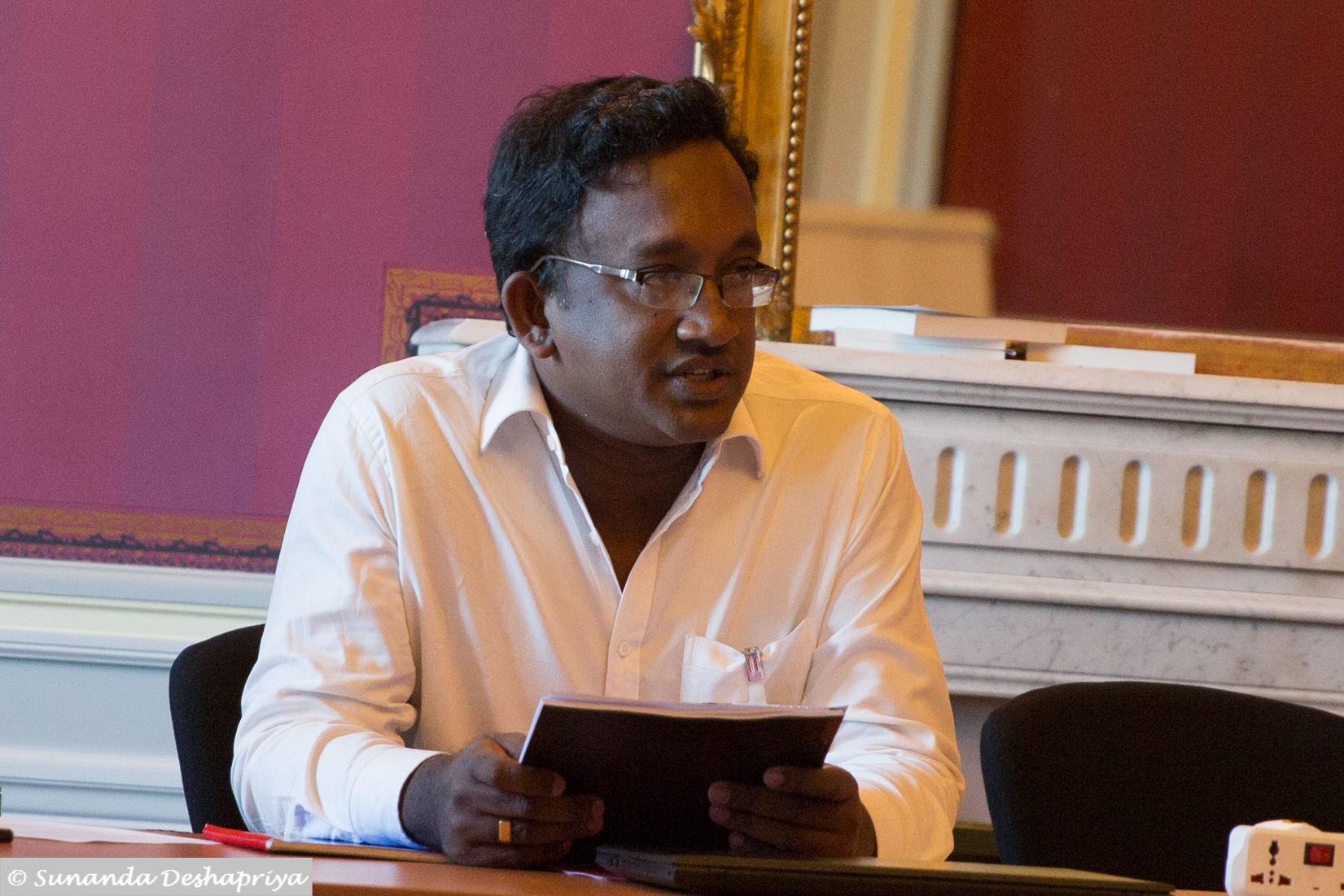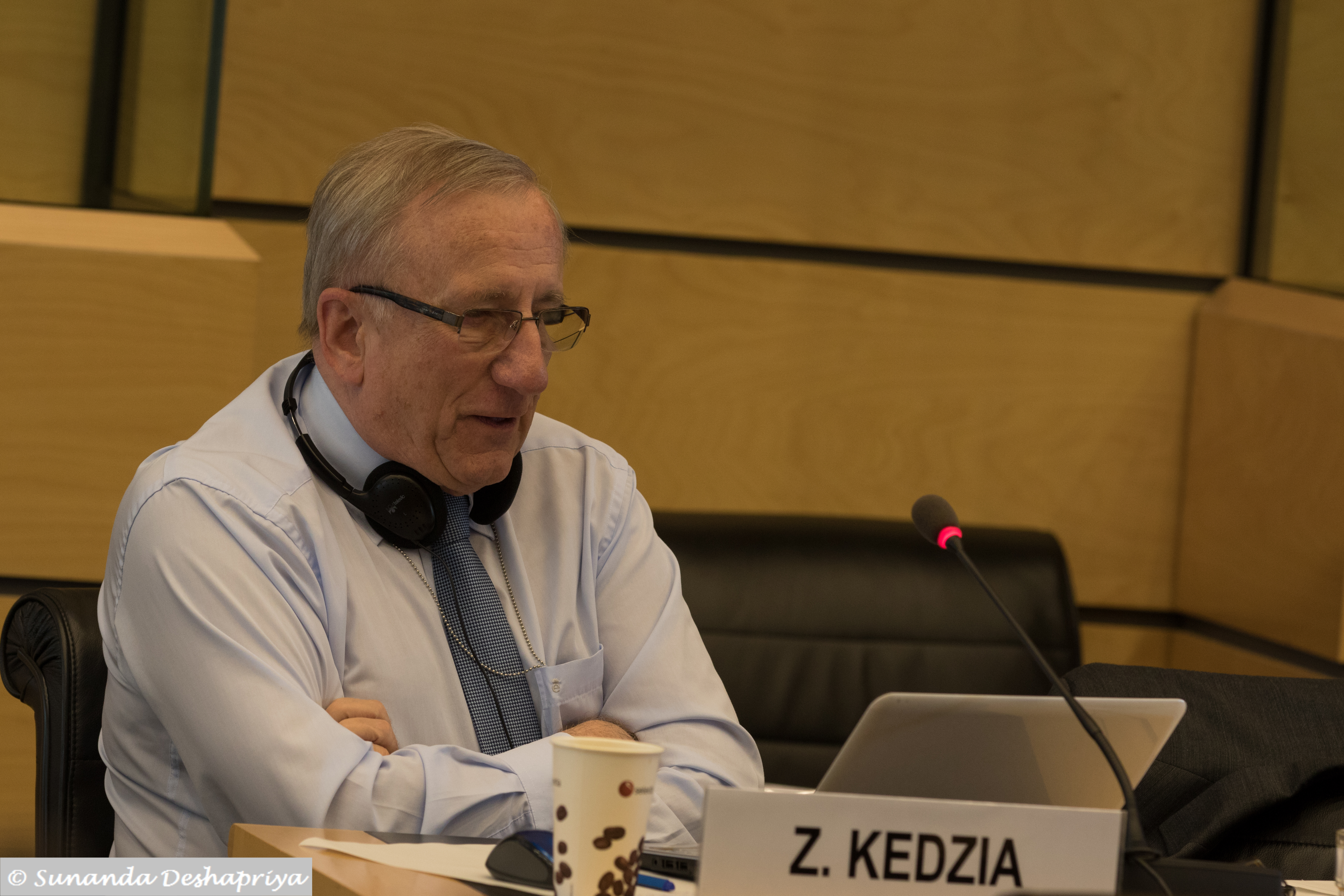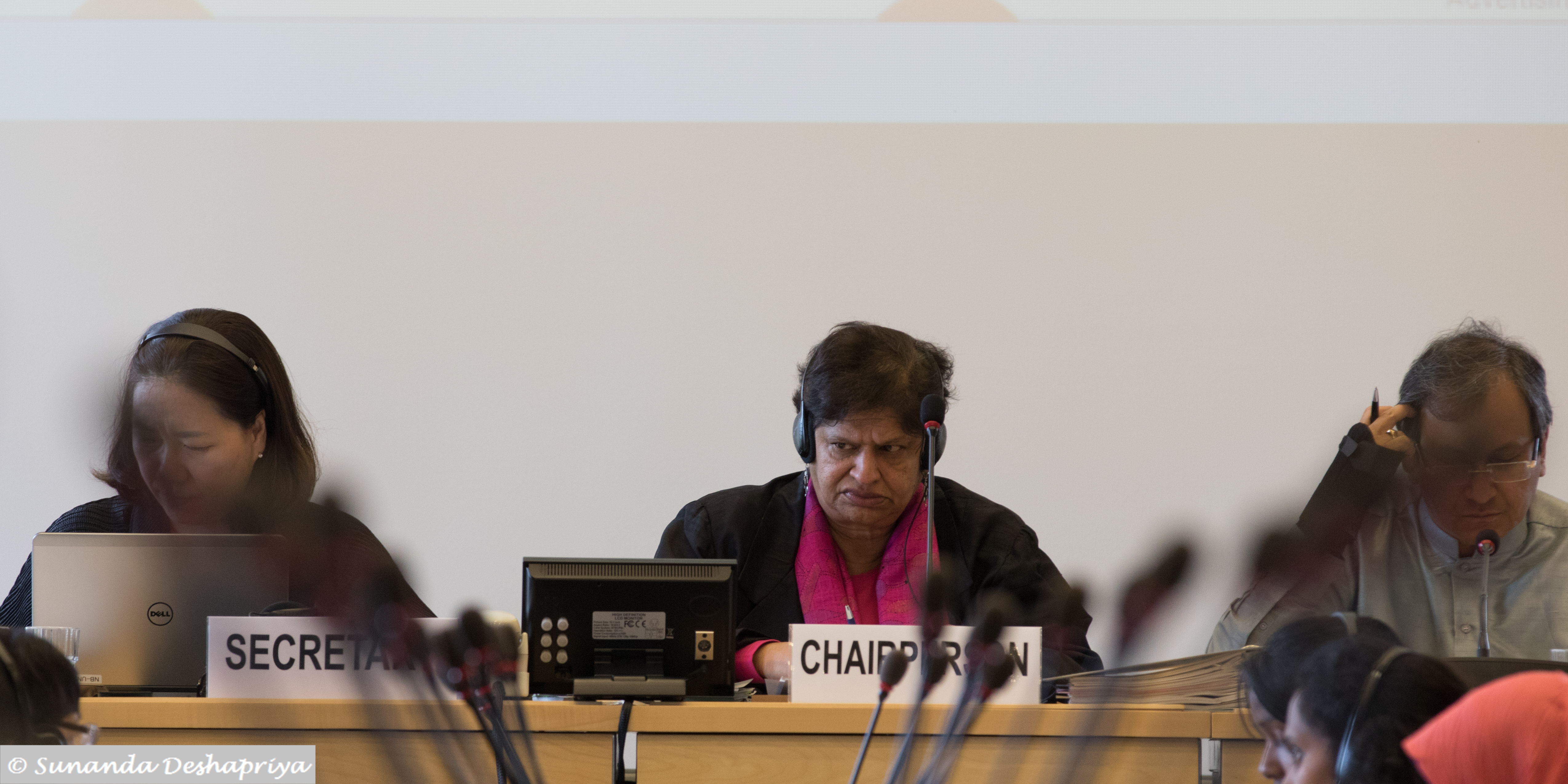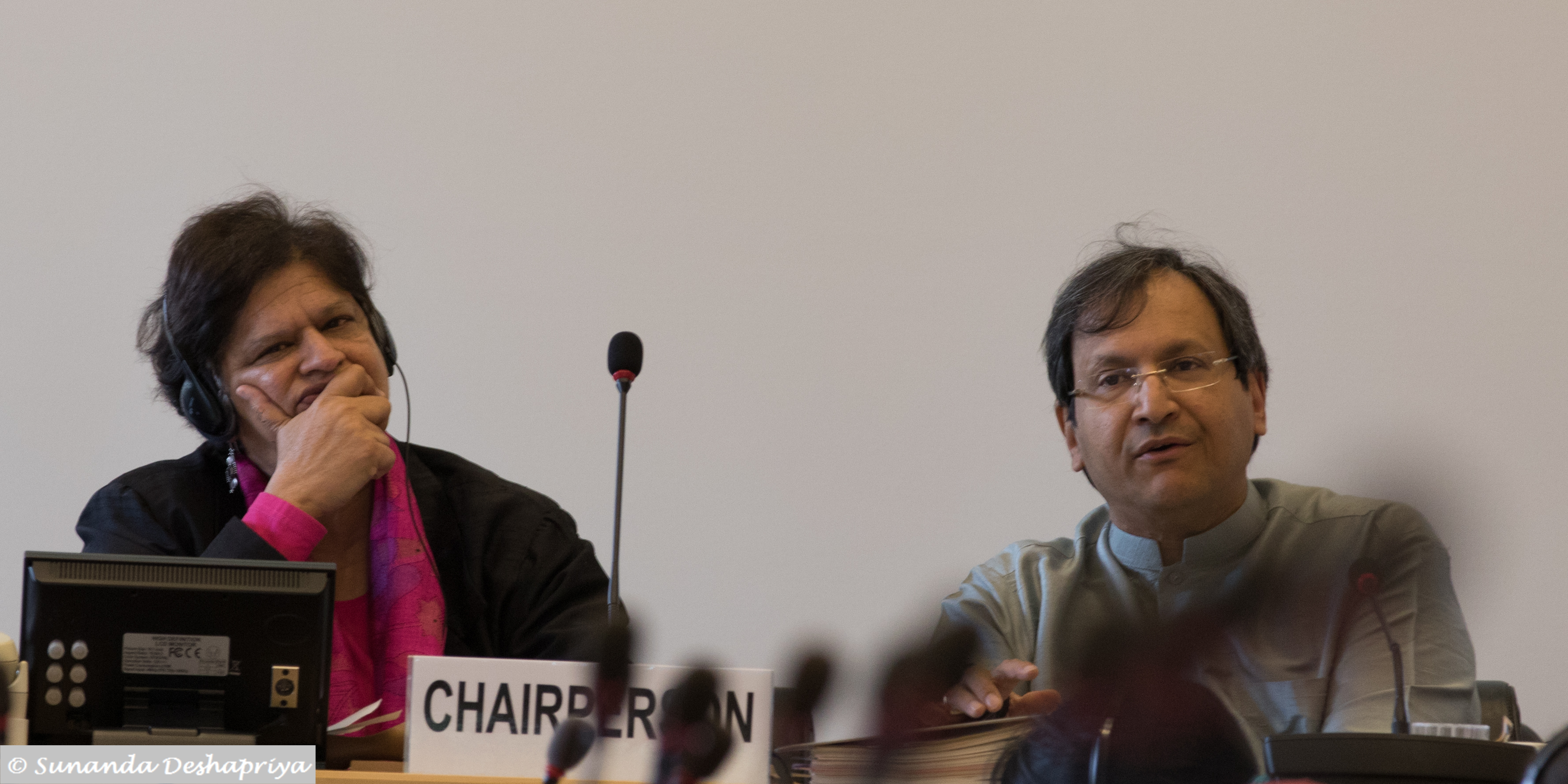Image: CESCR 61 Sri Lanka session was held 12-13 June at Palais Wilson, Geneva.©s.deshapriya.
Committee on Economic, Social and Cultural Rights: Concluding observations on the fifth periodic report of Sri Lanka*
8. The Committee recommends that the State party build on the national momentum and expedite its Constitutional reform process, including the adoption of a comprehensive Bill of Rights that fully incorporates economic, social and cultural rights, bearing in mind the indivisibility and interdependence of all human rights. The Committee encourages the State party to take into account the submissions of the Human Rights Commission of Sri Lanka to the Public Representations Committee on Constitutional Reform in this regard. The Committee draws the State party’s attention to its General Comment No. 9 (1998) on the domestic application of the Covenant.
10. The Committee recommends that the Human Rights Commission of Sri Lanka be established as an independent body by the new Constitution, and that its mandate is extended so that its investigate powers also cover economic, social and cultural rights. It also recommends that the State party take measures to ensure that the Commission has sufficient resources and that its recommendations are duly considered by the relevant State bodies. The Committee encourages the State party to ensure that the Commission seek re-accreditation by the Sub-Committee on Accreditation of the Global Alliance of National Human Rights Institutions.
12. The Committee encourages the State Party to take into account the recommendations of the 2017 Report of the Special Rapporteur on the Independence of judges and lawyers on her mission to Sri Lanka (A/HRC/35/31/Add.1), in order to ensure that judiciary is fully independent and duly representative.
14. The Committee recommends that the State party adopt a comprehensive anti-discrimination law, in accordance with article 2 of the Covenant. It furthermore recommends that it expand the non-discrimination clause in article 12(2) of the Constitution to also include, inter alia, the grounds of colour, national or ethnic origin, disability, sexual orientation or gender identity. The Committee draws the State party’s attention to its general comment no. 20 (2009) on non-discrimination in economic, social and cultural rights.
16. The Committee recommends that the State party take steps to prioritize the implementation of the National Plan of Action for the Social Development of the Plantation Community, in particular to eradicate poverty, ensuring adequate water and sanitation, expedite measures foreseen to construct individual houses for persons living in line rooms, addressing child malnutrition, and access to quality health care.
18. The Committee urges the State party to amend the Penal Code with a view to decriminalizing consensual same-sex conduct. It recommends that the State party take urgent steps to combat and prevent violence against LGBTI persons and ensure their equal enjoyment of all human rights, in particular their right to health, education, work and housing. It also recommends that the State party develop and implement training programs to educate and sensitize law enforcement, teachers, health care workers and public employees on LGBTI related issues.
20. The Committee recommends that the State party provide access to the labour market, social assistance, public education and health services for refugees and asylum-seekers. It recommends that the State partyput in place a national legal framework for refugees and asylum-seekers and accede to the 1951 Convention relating to the Status of Refugees. The Committee draws the attention of the State party to its statement titled The Duties of States Towards Refugees and Migrants under the International Covenant on Economic, Social and Cultural Rights (2017).
22. The Committee recommends that the State party make its fiscal system more equitable and significantly increase its fiscal revenues, to make possible a rise in public spending on social services, particularly in the areas of social protection, health and education, in line with its obligation under article 2(1) of the Covenant to progressively realize the rights contained therein.Any retrogression measures are acceptable under exceptional circumstances of economic hardships, providing, however, that they are temporary, non-discriminatory, proportional and do not affect disadvantaged and marginalized persons and groups.

24. The Committee recommends that the State party take steps to promote women’s full and equal participation in decision-making at the national and local levels,as well as to strengthen public awareness with a view to countering discriminatory stereotypes regarding the roles of women in the family and in the society.
26. The Committee recommends that the State party take steps to empower women, through gender-sensitive labour policies, adequate training, and re-training in order to enhance their access to the labour market, and effectively address sociocultural barriers that may negatively impact women’s opportunities for employment, in particular in sectors with high wage levels.
28. The Committee recommends that the State party take steps to increase the employment of persons with disabilities, including through implementing the established 3 percent quota in government positions for persons with disabilities, extending it also to the private sector;and ensure that vocational training programmes are of adequate quality, accessibility, and relevance and respond to the needs of the labour market as well as through guaranteeing physical accessibility of work places.
30. The Committee recommends that the State party take steps to progressively regularize the informal economy, whilst at the same time ensuring that workers in the informal economy enjoy their economic, social and cultural rights, in particular adequate wages and social security, and may join trade unions. It also recommends that the State party increase the number of labour inspectors. The Committee draws the State party’s attention to ILO recommendation no. 204 (2015) concerning the transition from the informal to the formal economy.
32. The Committee urges the State party to systematically review the national minimum wage with a view to setting it at a level sufficient to provide all workers and their families with a decent living. It also recommends that the State party ensure that workers in the informal economy are covered by the minimum wage.
34. The Committee recommends that the State party ensure that workers enjoy their trade union rights without undue restrictions or interference, and urges that iteffectively investigate all allegations of violations of trade union rights. It also recommends that the State party take steps to ensure that migrant workers have the right to join trade unions freely and to take part in trade union activities.
36. The Committee recommends that the State party, through its reforms of the social protection system, ensure universal social security coverage and sufficient benefits for all persons, including those from the most disadvantaged and marginalized groups, so that they may enjoy a decent standard of living;and that it set a social protection floor that includes basic social security guarantees. It draws the attention of the State party to its general comment no. 19 (2008) and its statement on social protection floors (2015).
38. The Committee recommends that the State party take urgent steps to extend the health coverage of the compulsory welfare insurance scheme operated by the Sri Lanka Bureau of Foreign Employment to ensure that migrant domestic workers are adequately covered for health care expenses in receiving countries. It also recommends that the State party take steps to ensure that migrant domestic workers are not left without insurance coverage after the 2-year insurance coverage period for reasons beyond their control.
40. The Committee recommends that the State party ensure that the national legal framework offers effective protection against sexual and gender based violence, including through the criminalization of marital rape. It recommends that the State party effectively implement the National Action Plan on Sexual and Gender Based Violence 2016-2020, including by increasing the number and improving the accessibility of shelters and ensuring that victims are not denied the right to make complaints in Tamil (for example by offering interpretation at police desks, in government departments and hospital gender based violence desks). The Committee also recommends that the State party intensify public awareness efforts to address discriminatory stereotypes against women and gender-based violence.
42. The Committee recommends that the State party amend the Muslim Marriage and Divorce Act and General Marriages Ordinance to prohibit child marriages, and eliminate practices that encourage child marriages, including through awareness raising and engagement with religious leaders.
44. The Committee recommends that the State party urgently adopt the draft national Child Protection Policy, create a comprehensive child protection system, and prioritize the implementation of the National Child Protection Programme adopted in 2017, ensuring sufficient mechanisms for children to report domestic violence or abuse and providing dedicated capacities in police stations to handle abuse complaints.It also recommends that the State party intensify efforts to eliminate child labour, in particular by implementing the National Policy to End Child Labour adopted in 2017.
46. The Committee recommends that the State party intensify its efforts to eradicate poverty, especially in or near urban areas, the North and East, the estate sector and Moneragala, including through ensuring that young people have access to employment opportunities in the industry and service sectors or to continuing education responding to the needs of the labour market.
48. The Committee recommends the State partyto adopt a legislative framework providing adequate legal protections against forced evictions and relocations for those without secure tenure to land and housing, and provide compensation and redress to those forcibly relocated, taking into account the Committee’s general comment no.7 on forced evictions, and the UN Basic Principles and Guidelines on Development-Based Evictions and Displacement.
50. The Committee recommends that the State party take measures to map private and public land under the control of the military, ensure its restitution, in line with the recommendation of the Consultation Task Force on Reconciliation Mechanisms,and end military involvement in commercial and other civilian activities. The Committee also recommends that the State party establish an independent National Land Commission and develop a national land policy, in line with the recommendations of the Lessons Learnt and Reconciliation Commission.
52. The Committee recommends that the State party effectively implement the National Policy on Durable Solutions for Conflict-Affected Displacement (adopted in 2016), and urgently address the factors that impede a resettlement of IDPs. Itrecommends that the State party provide compensation for destroyed housing and assistance to returnees to enable them to repair or build houses, and to ensure that basic infrastructural needs are met, including adequate roads, schools and hospitals where people have been or are to be resettled. The Committee recommends that the State party ensure that IDP camp inhabitants have access to sufficient and safe water and sanitation facilities, electricity, as well as schools and health care. The Committee also recommends that the State party conduct a comprehensive survey of IDPs, including identifying the current status of different communities with respect to durable solutions, including the Northern Muslims.
54. The Committee recommends that the State party urgently adopt and implementthe National Planfor Women Headed Households and ensure that women-headed households have access to livelihood assistance, housing and land in their own name, as well as low interest or interest free credit schemes. It also urges the State party to ensure that officials who commit sexual exploitation, bribery and harassment are prosecuted and sentenced, and victims have access to remedy and compensation.
56. The Committee recommends that the State party take urgent measures to improve the nutritional security of its population with specific attention to children, pregnant and lactating women, especially those in conflict-affected districts and in the plantation sector, and prioritize investments in climate resilient agriculture. It also recommends that the State party urgently adopt and implement the national action plan to reduce wasting and stunting (2017-2020). The Committee recommends that the State party take adequate measures to effectively address the situation of victims of the severe drought and heavy flooding which took place in 2016 and 2017.

58. The Committee recommends that the State party take steps, in particular within its Health Master Plan for 2016-2025, to address regional disparities in healthcare infrastructure and ensure affordable and accessible public health care. It also recommends that the State party significantly increase its budget for public health care, taking into account the fast-growing ageing population, and strengthen the Community Based Rehabilitation Programme for persons with disabilities and ensure its coordinated implementation, including with the Health Ministry
60. The Committee recommends that the State party intensify its measures to ensure that mental health care is available, accessible, timely and adequate, including through increasing funding, ensuring that there is a sufficient number of trained mental health professionals, decentralizing care provision, addressing regional disparities in service provision, improving referral systems, and ensuring social protection for families and patients. It recommends that the State party ensure the provision of systematic programmes for promotion of mental health and psychosocial wellbeing at the community level. The Committee also recommends that the State party urgently adopt the mental health policy under development by the Ministry of Health.
62. The Committee recommends that the State party urgently address the very high use of agro-chemicals, take steps to enforce the ban of glyphosate in all sectors, expand the ban to cover all agro-chemicals that adversely affect the health of the population and the environment, and carry out effective and frequent inspections.
64. The Committee recommends that the State party take urgent steps to address regional disparities in education, improve educational standards, technical and infrastructural facilities, as well as the availability of qualified teachers (including Tamil-speaking teachers), in particular in conflict-affected areas. It urges the State party to significantly increase its public spending on education, and establish the envisaged Education Inspectorate. The Committee also urges the State party to address the hidden financial costs of the public education system, ensuring its affordability, and eliminating the practice of donations for school admittance.
66. The Committee recommends that the State party intensify its efforts to ensure that all children with disabilities have access to and receive quality inclusive education.
68. The Committee recommends that the State party take immediate steps to ensure effective implementation of the Official Languages Law and National Trilingual Policy, including through a sufficient number of Tamil-speaking public officials and interpretersin every government institution, including at the provincial level, as well as the allocation of adequate financial resources for its implementation.
70. The Committee recommends that the State party conduct a comprehensive census which includes the element of the right of free self-identification of the Veddah people and address the root causes of their socioeconomic marginalization. It also recommends the State party ensure that the declaration of land as national parks and sanctuaries is always done in close consultation with those affected, especially the Veddah people. The Committee also urges the State party to undertake that all Veddah children attend school until the end of compulsory school age. The Committee also recommends that the State party ratify ILO Convention 169 on Indigenous Peoples.
72. The Committee recommends that the State Party undertake all efforts to ensure that economic, social and cultural rights are integrated into the policies and mechanisms of transitional justice.
Read the full report as a PDF:Concluding Observation Sri Lanka CESCR 61

